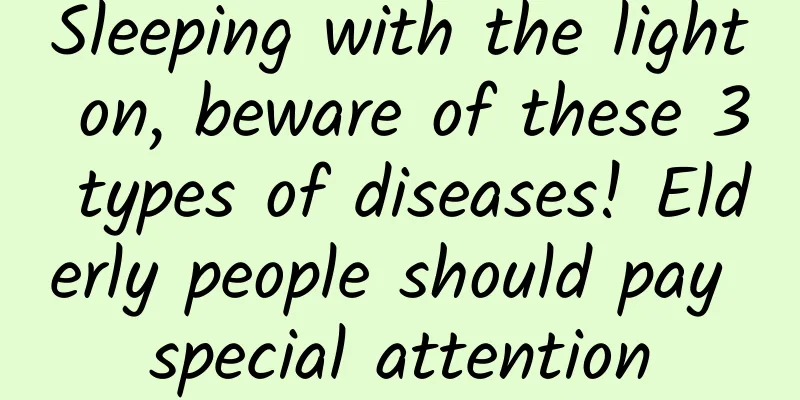Sleeping with the light on, beware of these 3 types of diseases! Elderly people should pay special attention

|
Some people like to fall asleep slowly in a dark environment, while others are used to sleeping with the lights on. However, different sleeping habits may have different effects. Did you know that keeping your bedroom dark when you sleep not only helps you get a good night's sleep, but may also reduce the risk of obesity and cancer. Studies have shown that people who are accustomed to being exposed to light during sleep have a higher prevalence of obesity. Recently, a new study published in the journal SLEEP showed that compared with adults who are not exposed to any light at night, older adults (63 to 84 years old) who use night lighting or place TVs, smartphones or tablets in the room may be more likely to be obese and have a greater chance of developing high blood pressure and diabetes. This was a real-world (nonexperimental) study of participants who were originally enrolled in the Chicago Heart Association Industrial Monitoring Program (CHA) conducted from 1967 to 1973. This was a public health program and epidemiological study that performed a detailed evaluation of known risk factors for heart disease. From about 2007 to 2010, researchers at Northwestern University conducted a separate Chicago Healthy Aging Study. Some participants from the original CHA study were included in the new project. Participants in the study underwent detailed examinations and filled out daily sleep diaries. Light exposure in the bedroom was measured via a device worn on the participants' wrists and tracked for seven days. The study found that among 552 participants with an average age of 72 years, 410 (74%) and 128 (23%) participants completed valid activity records for 7 days and 6 days respectively, and the remaining 14 participants (2.5%) completed valid activity records for 5 days. Less than half of the participants slept in total darkness for five hours. The rest of the participants were exposed to some light even during the darkest five hours of the day, which is usually when they go to bed at night. Compared with the group of participants who were not exposed to light, in terms of sleep variables, the participants in the group exposed to light at night had shorter total sleep time, shorter time in bed, longer wake-up time after sleep, and lower sleep efficiency. In addition, in the variable analysis, it was found that participants in the night light exposure group were more likely to have health problems such as obesity (41% vs 27%, p<0.001), diabetes (18% vs 9.8%, p=0.007) and hypertension (73% vs 59%, p<0.001). No significant difference was found in the prevalence of hypercholesterolemia between the two groups (59% vs 65%). Studies have shown that exposure to light at night may increase the risk of two of the most common chronic diseases worldwide, obesity and diabetes; it may also increase the risk of high blood pressure, a major risk factor for cardiovascular disease. "We live in an environment with a lot of artificial light 24 hours a day, whether it's using smartphones, leaving the TV on all night, or light pollution in big cities," said Minjee Kim, assistant professor of neurology at Northwestern University Feinberg School of Medicine and senior author of the study. "Older adults are at higher risk for diabetes and cardiovascular disease, so we wanted to see if the incidence of these diseases was associated with nighttime light." He further noted that "even small amounts of light at night can be harmful to health." "It's really important for people to avoid or minimize light exposure while they sleep," said co-corresponding author Phyllis Zee, MD, director of the Feinberg Center for Sleep Medicine. Emerson Wickwire, professor and chair of the department of sleep medicine at the University of Maryland School of Medicine, noted that this study adds to growing scientific evidence showing the importance of the body's biological clock and sleep to overall health, especially in older adults. How to reduce light and sleep better? The research team gave the following suggestions on how to minimize bedroom light to improve sleep quality and avoid these three health problems: Don't sleep with a light on. If you need to sleep with a light on for safety reasons, use a low-profile light that's close to the ground. Choose the right lamp and pay attention to the color of the light. Amber or red/orange light is less stimulating to the brain. Avoid white or blue lights and place it away from the bed. If you cannot control the outdoor light, to prevent the light in the bedroom from being too bright, you can use a blackout shade or wear an eye mask when sleeping. Pay attention to the placement of the bed so that outdoor light does not shine on your face. References [1] Minjee Kim, Thanh-Huyen Vu, et al., (2022). Light at night in older age is associated with obesity, diabetes, and hypertension. Sleep. DOI: https://doi.org/10.1093/sleep/zsac130 [2] Steven Reinberg. Light in your bedroom is no good for your health. Medical Xpress. Retrieved JUNE 22, 2022, from https://medicalxpress.com/news/2022-06-bedroom-good-health.html [3] Northwestern University. Light during sleep for older adults is linked to obesity, diabetes, high blood pressure. Medical Xpress. Retrieved JUNE 27, 2022, from https://medicalxpress.com/news/2022-06-older-adults-linked-obesity-diabetes.html |
<<: World Breastfeeding Week丨Do I need to reduce breast milk when adding complementary foods?
>>: Acupoints for health care | Sore throat: Massage Shaoshang and Zhaohai to relieve pain
Recommend
Can women practice yoga during menstruation?
Menstruation is a process that our female friends...
How to lose weight quickly and effectively after menstruation
After menstruation is a good time for women to lo...
Is it better to have more or less menstruation?
Whether a woman's menstruation is normal is d...
What are the methods to induce menstruation? These methods work fast!
Women pay attention to their menstrual conditions...
Can vaginal ultrasound detect ectopic pregnancy?
Pregnancy is a very happy thing. Early pregnancy ...
Is it normal to have less fetal movement in late pregnancy?
For pregnant friends who are in the late stage of...
What are the surgical procedures for induced labor at 4 months?
After a female friend becomes pregnant, it may be...
How can patients with hypertension detect kidney damage early? You will regret it if you don't read it!
Mr. Huang, 70 years old, has suffered from hypert...
What are the benefits of eating kiwi fruit for pregnant women?
Kiwi is a fruit with a relatively high vitamin co...
What to do if there is inflammation in the lower body
Female friends are very scared when they hear abo...
Will breast pain occur during menopause?
Menopause is a special period for women. When a w...
What does menopause mean for women?
Nowadays, most women are busy with their work all...
How many days can it take to detect an ectopic pregnancy?
For women who want to get pregnant and have child...
Low sodium helps regulate blood pressure and reduce the risk of stroke and heart disease
According to Xinhua News Agency in Sydney, an int...
What to check for induction of labor
In daily life, most people do not pay attention t...









